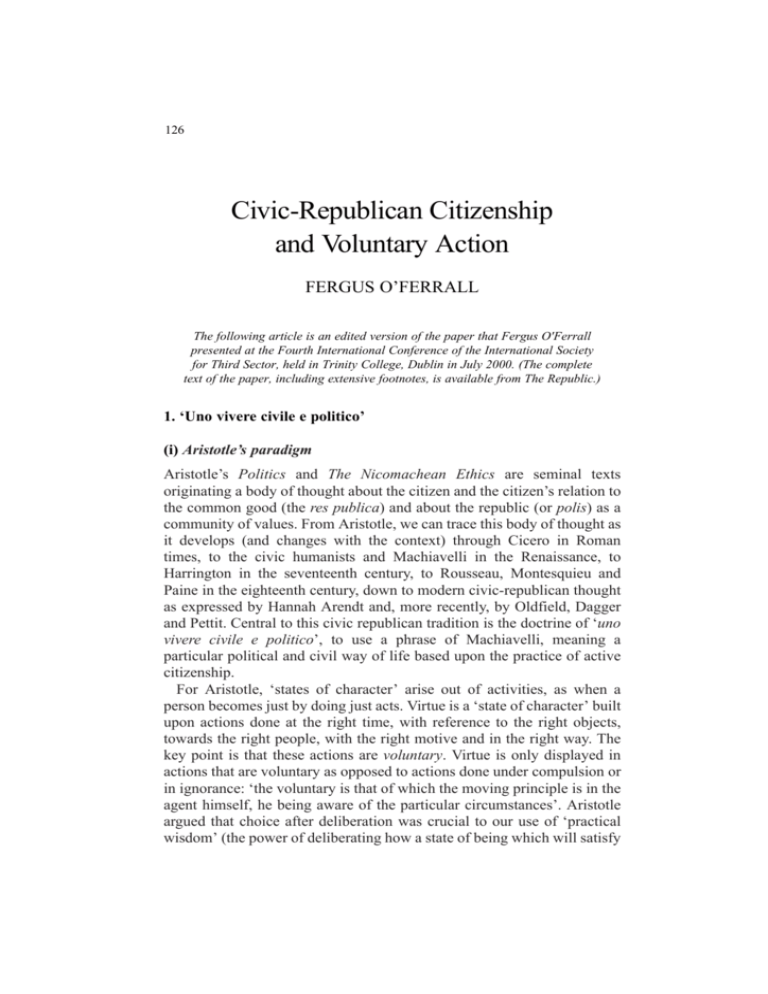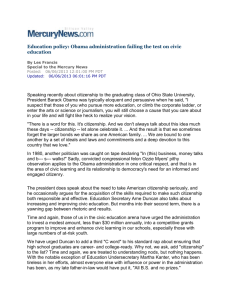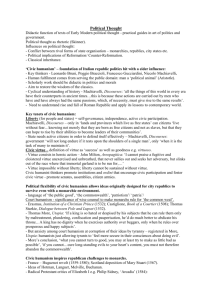Civic-Republican Citizenship and Voluntary Action
advertisement

126 Civic-Republican Citizenship and Voluntary Action FERGUS O’FERRALL The following article is an edited version of the paper that Fergus O'Ferrall presented at the Fourth International Conference of the International Society for Third Sector, held in Trinity College, Dublin in July 2000. (The complete text of the paper, including extensive footnotes, is available from The Republic.) 1. ‘Uno vivere civile e politico’ (i) Aristotle’s paradigm Aristotle’s Politics and The Nicomachean Ethics are seminal texts originating a body of thought about the citizen and the citizen’s relation to the common good (the res publica) and about the republic (or polis) as a community of values. From Aristotle, we can trace this body of thought as it develops (and changes with the context) through Cicero in Roman times, to the civic humanists and Machiavelli in the Renaissance, to Harrington in the seventeenth century, to Rousseau, Montesquieu and Paine in the eighteenth century, down to modern civic-republican thought as expressed by Hannah Arendt and, more recently, by Oldfield, Dagger and Pettit. Central to this civic republican tradition is the doctrine of ‘uno vivere civile e politico’, to use a phrase of Machiavelli, meaning a particular political and civil way of life based upon the practice of active citizenship. For Aristotle, ‘states of character’ arise out of activities, as when a person becomes just by doing just acts. Virtue is a ‘state of character’ built upon actions done at the right time, with reference to the right objects, towards the right people, with the right motive and in the right way. The key point is that these actions are voluntary. Virtue is only displayed in actions that are voluntary as opposed to actions done under compulsion or in ignorance: ‘the voluntary is that of which the moving principle is in the agent himself, he being aware of the particular circumstances’. Aristotle argued that choice after deliberation was crucial to our use of ‘practical wisdom’ (the power of deliberating how a state of being which will satisfy CITIZENSHIP AND VOLUNTARY ACTION 127 us is to be brought into existence). For Aristotle, the ideal constitution of a state would be one in which every citizen achieves well-being (eudaimonia), and the distribution of such well-being is essentially a matter of social justice. Virtuous action is what the person with ‘practical wisdom’ would choose: judgement is acquired by moral discipline, practice, and experience. Aristotle sees human beings as ‘political animals’ who by nature require to develop virtue with, or in association with, other people if they are to achieve human well-being. The ideal state he defined as ‘a community of equals, aiming at the best life possible’; a citizen was someone who participated in ‘giving judgement and holding office’. The citizen takes part in the determination of the general good, enjoying in his own person the values made attainable by society while contributing by his political activity to the attainment of values by others. Seeking the common good was clearly of a higher order than seeking particular goods for one’s own enjoyment. The pursuit of virtue was not opposed to, or even separate from, the pursuit of self-interest properly understood, for in pursuing the natural goal man fulfils his nature and achieves well-being. By serving others, he best develops himself. Aristotle conceived of a politeia (a constitution involving the formal distribution of authority) to make decisions within a universal decisionmaking process in which all citizens are participants: this was possible because the process of making a decision was so complex that it could be decomposed into a number of functions and each of these entrusted to a particular group. In this way, the politeia became the paradigm of a society organised in such a manner that any theoretically conceivable group had opportunity to contribute to decisions in the way for which it was best fitted, while any individual citizen might contribute many times over, both as a member of any specialised group for which his attainments might qualify him and as a member of the demos, the citizen body as a whole to which all belonged. (ii) The transmission of the Aristotelian paradigm The transmission of the Aristotelian paradigm from Aristotle’s period, 384-322 BC, to the twenty-first century is a story of intense periods of articulation and practical achievement, followed by long periods of eclipse. A key period for republican thought is that dominated by the writings of Marcus Tullius Cicero (106-43 BC), including The Republic, The Laws and On Duties. Cicero is heavily influenced by Greek thought, including that of Aristotle. Cicero’s use of res publica is important to understand: it means literally ‘the public thing’; in his book De Republica (The Republic) Cicero defines 128 FERGUS O'FERRALL res publica as ‘res populi’, ‘the thing of the people’. It can simply mean nation, community or political community. But it can also mean the Roman Republic: the Roman res publica is contrasted with the monarchy that preceded it. Again, the phrase may refer to the public political activity that was for Cicero the essence of the free republic. Cicero can describe himself as having been completely devoted to res publica, that is, to public life. So he uses res publica to refer primarily to different aspects of one and the same thing: a type of political activity that constituted the political community at its best. He interprets the virtues in terms of the obligations of role and relationships: obligations to other individuals or to the res publica as a whole. The subject of The Republic might be defined as de optimo statu civitatis et de optimo cive (‘on the best condition of the state and the best citizen’). Cicero’s subject (the ‘Ideal State’ and the ‘Ideal Citizen’) leads him to an urgent defence of the life devoted to public service against the Epicurean view that the wise man will preserve his freedom by remaining in a private station. Cicero argues that the desire to make life better for others is implanted in human nature. He advances the well known republican formula of the mixed or balanced constitution, which predominated in political thought and, indeed, republican thinking until the late eighteenth century. The latter part of De Republica has come down to us in a very fragmentary condition. It seems to have discussed education and the influence of the arts. There was also a long discussion of the ‘Ideal Citizen’, taking as models the great Romans of old with their conception of civic and military glory through public service. One of the most formative developments in historical research since the 1960s has been the rediscovery of the importance of the political ideas associated with Niccolò Machiavelli (1469-1527) and the Italian cityrepublics of the sixteenth century. The seminal work of J.G.A. Pocock and Quentin Skinner has provided the requisite historical foundation for the revival of civic republicanism in the 1990s. The last thirty years have seen great advances in Machiavellian scholarship and that concerned with civic humanism in general. In 1970, Bernard Crick had perceptively observed that Machiavelli’s ‘main substantive preoccupation, indeed his good obsession, was with the conditions for republican government’. The tradition of civic republicanism, recovered by Skinner, Pocock and others, provides, after Aristotle and Cicero, a further basis for developing a normative theory of voluntary action as active citizenship. Voluntary action in this tradition may be best understood as an expression of active citizenship of a political order of free and equal citizens; an order conducted according to laws which rest upon the deliberation and free consent of those citizens. The early modern CITIZENSHIP AND VOLUNTARY ACTION 129 republican theory associated with Machiavelli and Florentine political thought embraced the res publica or Aristotelian polis in a way which ‘was at once universal, in the sense that it existed to realise for its citizens all the values which men were capable of realising in this life, and particular in the sense that it was finite and located in space and time’. This republican theory has left an important paradigmatic legacy in western political thought: the Italian city-republics provided the historical basis for what Held describes both as ‘a distinctive new trajectory in civic life and political ideas’ and as the ‘reforging of republicanism’. These city-republics, beginning with Marsilius of Padua (1275/801342), marked the first occasion in post-classical political thinking when arguments were developed for and on behalf of self-determination and popular sovereignty: that the highest political ideal is the civic freedom of an independent self-governing people. The early modern republicans traced their thinking back to the ancient Roman Republic, as Viroli notes in his key work on Machiavelli: Niccolò Machiavelli was the restorer of the Roman conception of politics as civic wisdom—that is, the idea of politics as the wisdom of the citizen whose aim is to preserve the civil life—and the founder of the theory of modern republicanism based upon this conception. Held analyses the early modern republican tradition and identifies two strands: ‘civic humanist republicanism’ (or developmental republicanism) which is contrasted with ‘civic or classical republicanism’ (protective republicanism). The first, ‘developmental’ republicanism, stresses the intrinsic value of political participation for the development of citizens as human beings, while the second, ‘protective’ republicanism, emphasises its instrumental importance for the protection of citizens, especially their personal liberty. Rousseau, in the eighteenth century, is the exemplar par excellence of the first while Machiavelli is that of the second strand. A citizen is one who participates in the civil community, either in government or in the deliberative or judicial functions of the polity. Citizenship is the means to involvement in a shared enterprise orientated towards the realisation of the common good, and political participation is the necessary vehicle for the attainment of the good. Niccolò Machiavelli is a pivotal figure in regard to the fate of this key doctrine. Machiavelli sought to locate in such civic involvement the preconditions of independence, self-rule and glorious endeavour (civic glory) in the context of the realities of the new emerging European political order. Contemporary scholars, like Skinner and Pocock, give appropriate stress to Machiavelli’s The Discourses (as opposed to The Prince, which for too long was taken as Machiavelli’s major contribution). Machiavelli 130 FERGUS O'FERRALL linked the classical emphasis on the primacy of civic life directly to the requirements of ‘power politics’: he is the father figure of ‘protective republicanism’ as a model of democracy. Political participation is a necessary condition of liberty. The republic, as Bernard Crick has written, was to Machiavelli ‘the best of all possible worlds and he tried to show that it had to be and could be, not merely should be, remarkably tolerant of internal conflict and dissent’. Machiavelli uses ‘republica’ in two senses as Crick has noted; as a general word to stress, in the old Roman sense of res publica, the things that are common to a people (the systematic relations of régime to society) and, in a narrower sense, a republic specifically of the Roman kind— based upon ‘uno vivere civile e politico’, a political and civil way of life or the practice of citizenship; ‘uno vivere civile’ is an independent community with its own laws. Such a community requires virtù, a word which conveys ‘a whole classical and renaissance theory of man and culture’. Essentially it implies a specifically civic spirit—a quality of mind and action central to citizenship. It implies a political morality based upon spirited action. For Machiavelli, key questions to ask are: does a state have virtù among its inhabitants or not? Have the inhabitants relapsed into ozio (indolence or corruption)? Are there in a word citizens? Viroli argues persuasively that Machiavelli’s treatment of political virtue ‘can be grasped only if we read it as connected to his overarching commitment to the principle of the rule of law. The political virtue that he invokes and tries to revitalise is the energy, the courage, the craft that serves to institute or restore the rule of law and civil life’. Machiavelli stresses the rule of law—living under laws to which citizens have freely given their consent—in order to avoid a condition of dependency. Dependency causes fear, because to be in a condition of dependency means to be under the permanent possibility of being coerced and oppressed. And fear generates servile habits which are incompatible with the status and the obligations of a free citizen. Viroli demonstrates in a way which is quite original in Machiavellian scholarship that love of country (patriotism) is the passion which, according to Machiavelli, moves citizens to pursue the common good, to resist tyranny, to ward off corruption and to keep alive a free and civil way of living: Like Roman republican philosophers and historians, he interprets it as being charitas reipublicae and charitas civium—that is, a compassionate love of one’s fellow citizens and of the institutions, the laws, and the way of life of the republic, CITIZENSHIP AND VOLUNTARY ACTION 131 which gives the citizens the lucidity to see the common good and the strength to carry it out. For Machiavelli, ‘the political man’ is ‘a magnanimous soul who commits himself or herself to goals that go beyond the horizon of selfinterest, family, or social group but encompass the entire political community, the republic at large’. In early sixteenth-century Florence, public rhetoric, philosophy and historiography were ‘pervaded by the Aristotelian and Ciceronian interpretation of politics as the Respublica— that is, a community of free and equal citizens living together for the common good under the rule of law—and by the ideal of the political or civil man, understood as an upright citizen who serves the common good with justice, prudence, fortitude and temperance’. (iii) Republican thought in the seventeenth and eighteenth centuries In 1945, Zera S. Fink published The Classical Republicans, An Essay in the Recovery of a Pattern of Thought in Seventeenth Century England. In this pioneering work, Fink traced how classical republican political ideas, associated particularly with Machiavelli, were adopted, adapted and modified in seventeenth-century England. The key figure in this context is James Harrington, the author of the republican utopia Oceana published in London in 1656. John Milton and Algernon Sidney were also significant in defending republicanism on the abstract ground that it was implied by natural law and the sovereign power of the people. Harrington stood alone among the political writers of his time in seeing that government is determined both in its structure and in its working by underlying social and economic forces, especially the distribution of property, particularly property in land. Harrington drew heavily upon the examples of the Venetian republic, Machiavelli and Aristotle to outline his ‘equal commonwealth’ which, he argued, alone of all forms of government permits liberty and gives adequate scope for true statesmanship and public spirit. His political ideal was the ancient republic under aristocratic auspices. Seventeenth-century classical republican thought proved very influential in Britain and what was to become the United States of America in the eighteenth century. The lasting significance of the seventeenth-century classical republicans is that they provided the conduit for republican ideas from early modern times into the modern era of democratic radicalism. The key idea here is that of the independent citizenry—‘a republic of freeholders’—shaping civil and political life. Republicans were utterly opposed to any citizen being dependent upon others. 132 FERGUS O'FERRALL As Pocock has observed of Oceana: Harrington conveys what was to be perhaps his chief gift to eighteenth-century political thought: the discovery of a means whereby the country freeholder could equate himself with the Greco-Roman polites and profess a wholly classical and Aristotelian doctrine of the relations between property, liberty and power. The Aristotelian concept of citizenship was transmitted through the identification of freeholder with citizen. Harrington’s influence is evident in what might be called the ‘semi-republican’ flavour of English eighteenth-century political thought, notably that associated with ‘country’ versus ‘court’. ‘Country’ ideologues saw contemporary politics in classical terms, with the crown-in-parliament standing for the mixed constitution, the freeholders of the shires for Roman citizens, and the court and national debt for the ‘luxury’ and ‘corruption’ that proverbially destroyed all free states. The presence of this vocabulary made it easier for American revolutionaries to see a republic as the constitutional solution to their problems on the larger scale, rather than seeing republics as exclusively belonging, as they had in the past, except for Rome, to smaller states. In order to do so, however, American republicans absorbed eighteenthcentury political philosophy, especially that of Montesquieu (1689-1755). He identified republican states with the principle of virtue, and, as Shklar says, he ‘delegitimised’ monarchical ideology which had sought to take over republican virtues, ‘by exposing it as essentially fraudulent’. While Montesquieu never assumed that republican forms of government would apply to large modern states, Jean-Jacques Rousseau in The Social Contract (1762) recreated republicanism to fit the modern world. Rousseau’s intensely republican book embraced the Aristotelian paradigm of citizenship with its great themes of liberty and virtue. Rousseau positively asserts that it is only through living in civil society that men can experience their fullest freedom. As social beings, human beings are citizens and must act as citizens. As citizens, each is equal to the other, and, as a body, they collectively determine the laws they are going to live under and acknowledge an obligation to obey. In this way they free themselves from their dependence on others’ wills: they achieve both civil and moral liberty and, in the process, realise their full human potential for happiness as morally autonomous beings. In the period of the ‘Atlantic Revolutions’ republican political thought was rapidly put into practice: the idea of the representation of the people’s will in a representative democracy predominated over the classical view of active citizenship of earlier republican thought. As Held has noted, CITIZENSHIP AND VOLUNTARY ACTION 133 from the early nineteenth century the meaning of the concept of liberty changed: Liberty progressively came to evoke less a sense of public or political liberty, ‘the right of the people to share in the government’, and more a sense of personal or private liberty, ‘the protection of rights against all governmental encroachments, particularly by the legislature’. Republicans now differed as to the relative emphasis they placed on ‘virtue’ in the citizenry as opposed to institutional ‘checks and balances’ in preserving liberty. However, in the early example of the new Republic in America there is evidence that political and intellectual leaders worked hard to inculcate the ‘civic virtues’ in their fellow countrymen and countrywomen. This was especially a feature of educational reform, but also the arts, literature, drama, architecture and the use of symbols were employed in developing the virtues believed necessary to the survival of the Republic. It was believed that unless sufficient numbers of citizens were willing to put public interests before their own private interests the common good could not be achieved. The new American Republic was a novel experiment, and it needed the virtues of civic republicanism. 2. Voluntary action and civic republicanism The modern civic republican tradition provides a theoretical basis for a developed form of participatory democracy: civic republicans emphasise the intrinsic value of political participation for the participants themselves as ‘the highest form of living-together that most individuals can aspire to’. This presents a challenge to the very privatised and impoverished view of what it means to be a citizen long accepted and still current in democratic societies; civic-republican insights may be associated with ‘civil society’ theorists, who argue that it is in the voluntary organisations of civil society that citizens learn the virtues of mutual obligation. There is increasing support from different democratic political traditions and theories for the belief ‘that citizenship must play an independent normative role in any plausible political theory and that promotion of responsible citizenship is an urgent aim of public policy’. One important instrument of such a policy would be the promotion of voluntary organisations for public benefit, enabling citizens to identify with the res publica. The dynamic open-ended possibilities of civic republicanism allow for the fullest development and expression of voluntary action through active citizenship. As Fontana has concluded, ‘the true heritage of the bourgeois liberal republic is not so much what it has achieved, but the chances it leaves open’. A republican state ‘must connect with a form of civil society 134 FERGUS O'FERRALL in which republican values are firmly entrenched’. A republic is founded upon a constitutional order of equal citizens: The republic sought to found its authority on lex rather than rex, and prudentia rather than providentia. It called for a theory investing humans with the ability to inaugurate new orders in the realm of secular history. This ability became identified with the Latin term, virtus, a reworking of the Greek term, arete, meaning the power by which persons act effectively in a civic context. It is a form of civic action largely influenced by the Aristotelian conviction that political and social association are natural to human beings … In short, virtue is acknowledged as a moral and political relationship of citizenship, a relationship in which each citizen agrees to rule and be ruled in such a way that one’s own civic virtue is intimately bound up with that of one’s fellow citizens. Richard Dagger has shown that liberalism and republicanism may be blended successfully and that the republican-liberal conception of citizenship ‘links our enduring concern for self to the public life of a deliberative citizen’. Dagger argues ‘that the republican-liberal citizen is someone who respects individual rights, values autonomy, tolerates different opinions and beliefs, plays fair, cherishes civic memory and takes an active part in the life of the community’. The nature of these virtues indicates that much of the cultivation must take place in families, neighbourhoods, churches, the workplace and in voluntary associations of many kinds—in brief in what has come to be called ‘civil society’; as Dagger observes, ‘republican liberals will want a thriving civil society’. It is important therefore to increase the number and enhance the power of voluntary associations that connect the private and public aspects of life. Dagger concludes: Civil society can indeed promote the public good by serving as a buffer between the individual and the state. But this is not all that it can or should do. Civil society must also be civil in two senses of the word. First, it must promote civility in the sense of a decent regard for the rights and interests of others, including their right of and interest in autonomy. Second, civil society must promote civility in the sense of civic responsibility—of citizens working together for their common good. In both ways, civil society teaches the civic virtues. The twentieth century saw the arrival of universal franchise in liberal democracies. In the twenty-first century, the challenge will be to translate this ‘formal’ citizenship into an active citizenship based upon an ideal of civic participation which integrates and involves ordinary people in a democratic republic. It is the people who should govern all aspects of their society which directly concern them. Participatory democracy requires to be developed to supplement formal representative democracy. As Charles Leadbetter has stated, ‘civic spirit’ is ‘the big idea for a new political era’. The values cherished by people in society are fostered and preserved not CITIZENSHIP AND VOLUNTARY ACTION 135 simply through formal institutional arrangements (such as free elections between competing parties) but also through the exercise of virtue or civic spirit—a willingness to set the good of others above one’s private desires or individual interests. The exercise of such virtue can only be done in cooperation with others. This is at the heart of classical civic republicanism: the common business (res publica) of the citizens should be conducted by them for the common good. Civic republicanism developed from the belief, developed in the sixteenth century but drawing inspiration from the ancient world, that the state should be an integral part of a free, flourishing society, by acting in the interests of all and being guided by the active participation of its citizens. Voluntary organisations are vital for the development of the kind of political culture which is able to sustain a free public life through active citizenship. Hannah Arendt (1906-75), who, like Mill, was aware of the novel and spontaneous possibilities inherent in voluntary action, also saw politics as a peculiarly open-ended and unpredictable activity. Arendt favoured what she usually spoke of as ‘public freedom’: the direct participation in politics by ordinary citizens. Arendt, as Canovan observes: Rethinks politics itself, focusing attention on the plural and spontaneous nature of action … she stresses the openness of the future, the capacity of political actors to make new beginnings and do the unexpected. She had faith in the permanent possibility of action by those who choose to accept their responsibility as citizens. She was aware that even when the outcomes of political action are desirable, they are also contingent and fragile, dependent on the continuing action of those who care about the political realm. Arendt’s work is important for a revitalised concept of active citizenship because she recognised ‘that it is plurality—the fact that we are all the same precisely in being different, and that each of us is capable of acting spontaneously and of thinking our own thoughts—that is at the heart of being human, and that finds its clearest expression in politics’. Plural viewpoints and plural initiatives are at the heart of politics, and this, Arendt felt, had been ignored by political philosophers and in political theory. As Canovan states, in the Arendtian view, the ability to act, inherent in human beings, is the key to politics: When we act, we reveal that we are free beings, as Rosa Parks and Martin Luther King did in the American South, and as Lech Walesa and his comrades in Solidarity did in Poland. So utterly unpredictable are such actions that Arendt describes the capacity to act as ‘the one miracle-working faculty of man’. As the place of action, politics is also the arena in which freedom in this characteristically Arendtian sense of beginning something new can be most fully displayed and enjoyed. This action is always interaction: we take initiatives that need the co- 136 FERGUS O'FERRALL operation of others, and Arendt’s work directs us to rediscover the possibilities of action amongst citizens. Arendt’s message is therefore that ordinary citizens can be free and powerful; not by waiting for something in authority to give them power, but by having the courage to act in concert and create their own public space. Such spaces do not need pre-existing institutions, but come into existence among those who act together. This vision of public-spirited citizens and their creative functions is fundamental to a flourishing democratic society and has tended to be ignored until recently in mainstream democracy theory. Arendt’s contribution is to provide an historically informed philosophical underpinning to the vital role played by voluntary action in society. She sees such action as lying in the capacity that belongs to all individuals for starting something that had never existed before and so to realise both power and freedom: her stress on spontaneity and calling the new into existence is crucial and distinctive to the citizen’s role in Arendt’s version of republican freedom. As Jeffrey Isaac has noted, there are many similarities between her conception of civic engagement and that of Havel. Arendt believes that citizens have the capacity not just to choose between prescribed alternatives, as in representative democratic systems, but in co-operation and solidarity with others to call entirely new possibilities into existence: they have the role of initiative rather than simply the role of choice; in this she clearly recalls the Tocquevillean view of democracy. 137 CITIZENSHIP AND VOLUNTARY ACTION Appendix: The Civic-Republican Tradition and Related Texts Author Key texts B.C. 384-322 Aristotle The Nicomachean Ethics Politics 106-43 Cicero The Republic The Laws On Duties A.D. 1275/80-1542 Marsilius of Padua Defensor Pacis 1469-1527 Machiavelli The Discourses 1611-77 Harrington The Commonwealth of Oceana 1689-1755 Montesquieu De L’Esprit des Lois 1712-78 Rousseau The Social Contract 1737-1809 Paine Common Sense The Rights of Man 1805-59 Tocqueville Democracy in America1 1806-73 Mill On Liberty2 1906-75 Arendt The Origins of Totalitarianism The Human Condition On Revolution 1978 Havel The Power of the Powerless 1990 Oldfield Citizenship and Community Civic Republicanism in the Modern World 1997 Pettit Republicanism: A Theory of Freedom and Government Dagger Civic Virtues: Rights, Citizenship, and Republican Liberalism Notes 1 Tocqueville was, as he described himself, ‘a liberal of a new kind’; he has an essential place in civic-republican literature for many reasons including his insights into the effects of the growth of democracy upon liberty which he regarded as ‘a sacred thing’ and his debt to Rousseau. 2 Mill, much influenced by Tocqueville, has an important place in the civic-republican pantheon because he sought to provide a ‘civil or social liberty’ in On Liberty and he emphasised certain classical republican features in the liberal polity he outlined. Copyright © The Republic and the contributors, 2001 The Republic, The Ireland Institute, 27 Pearse Street, Dublin 2, Ireland








